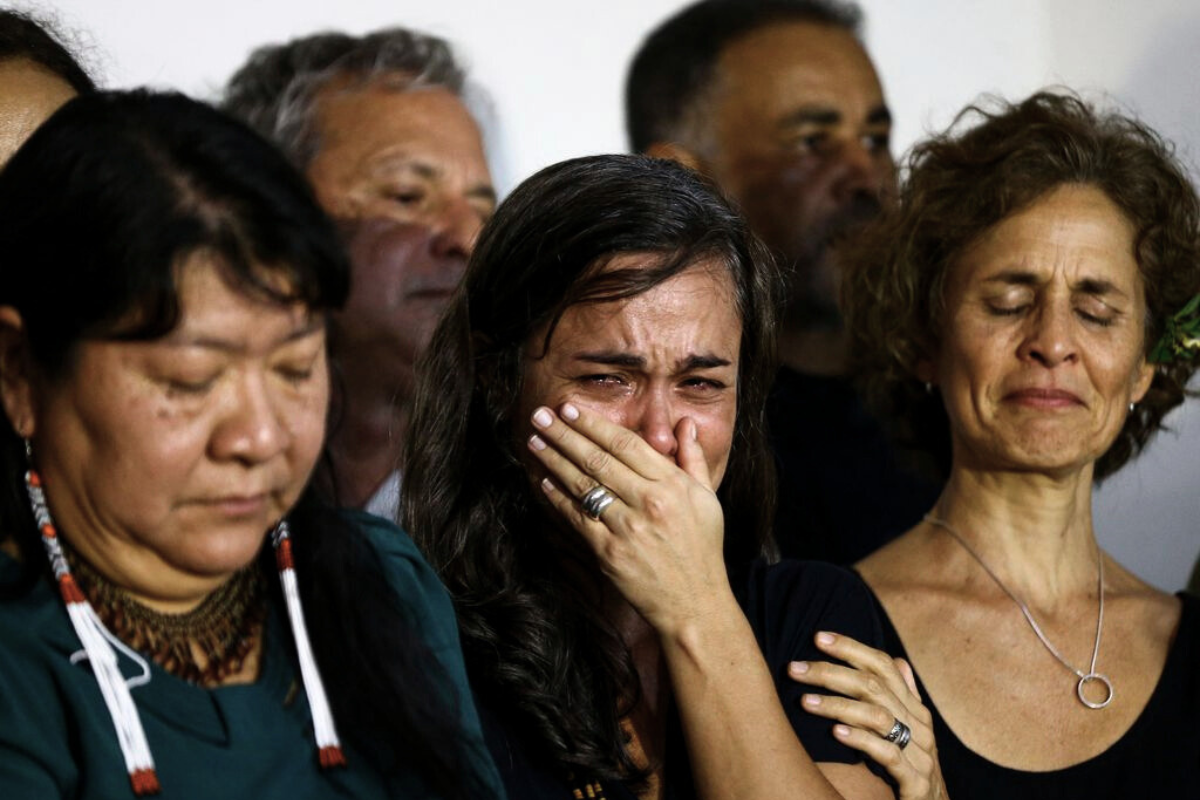Events were held across Brazil and in the United Kingdom on Monday to mark the one-year anniversary of the deaths of Brazilian indigenous expert Bruno Pereira and British journalist Dom Phillips, who were murdered in the western Amazon last June.
Speaking to a small crowd of supporters gathered on Copacabana Beach in Rio de Janeiro, Mr. Phillips’s widow Alessandra Sampaio called for stronger government efforts to protect the Amazon and the indigenous people who live in and help conserve the rainforest.
“It’s intolerable that indigenous people are still under threat and are still being killed. When will this stop? Wasn’t the death of Dom and Bruno enough?” Ms. Sampaio said.
Mssrs. Pereira and Phillips were ambushed and killed while traveling back from the remote Javari Valley last year, where they had been speaking to local indigenous people about their efforts to fight crime encroaching on their protected land. They disappeared on June 5, 2022, and their bodies were found after a ten-day search.
A year later, their families continue to demand that the killers be held to account and that justice be served.
Three fishermen have been charged with the murders and are in prison while awaiting a decision on whether they will face trial by jury. On Sunday evening, it was revealed that two other men have recently been indicted in relation to the murders, including the alleged mastermind, a man named Rubén Dario da Silva Villar who is known by the nickname “Colômbia.” Mr. Villar is also accused of running an illegal fishing network on the border between Brazil, Colombia, and Peru.
Mr. Pereira, who had taken leave of absence from the indigenous affairs agency Funai during the Jair Bolsonaro government, was working with the Union of Indigenous Peoples of the Javari Valley (Univaja) and Observatory for the Human Rights of Isolated and Recently Contacted Indigenous Peoples (OPI) at the time of his death. Mr. Phillips had been working on a book called How to Save the Amazon.
The two men and their work were remembered and celebrated at the events this Monday, which are being held in Salvador, Belém, Brasília, Campinas, and Atalaia do Norte, the Amazon town closest to where Mssrs. Pereira and Phillips were killed, as well as Rio and London.
A number of projects have been launched to keep their legacy alive. Forbidden Stories, a France-based network that strives to continue the work of journalists who have been silenced, launched last week a series of investigations carried out over the past year by journalists from 16 media outlets, known as The Bruno and Dom Project.
Ms. Sampaio is preparing to set up an NGO that will provide information about Amazon-dwelling indigenous peoples, while Mr. Phillips’s incomplete manuscript will be finished by a group of experienced journalists, friends and colleagues of the late reporter who want to ensure his book sees the light of day.
Environment Minister Marina Silva also paid tribute to the two men today during the unveiling of new environmental measures by the government in Brasília, an event to which Ms. Sampaio and Beatriz Matos, Mr. Pereira’s widow, were invited.
“Exactly one year ago, this crime shocked the world and exposed the fragility of an Amazon given over to criminal organizations that deforest and kill anyone who crosses their path to defend the forest and its native peoples,” Ms. Silva said.
Beto Marubo, an Univaja representative who took part in the event in Rio, stressed that indigenous peoples continue to face more threats than ever, highlighting recent setbacks to indigenous rights in Congress, and demanded that the government of Luiz Inácio Lula da Silva take more decisive action in the Javari Valley.
“The Brazilian government owes the world an explanation, and about what measures it is taking from now on. What is Brazil actually going to do? We still don’t have an official response from the authorities,” the indigenous leader said.


 Search
Search






































